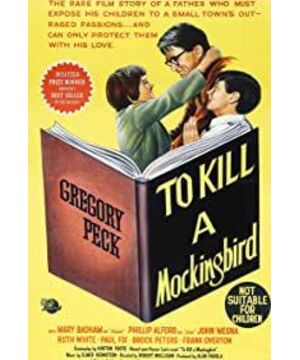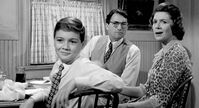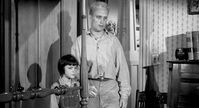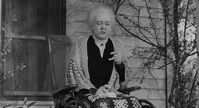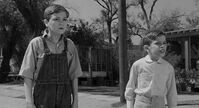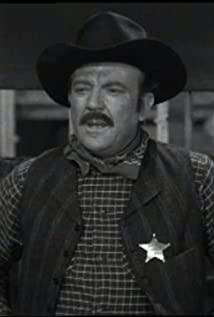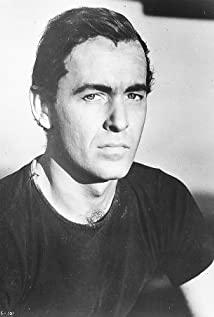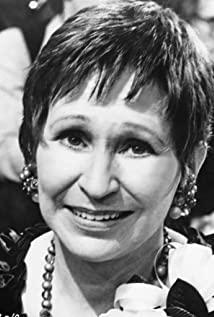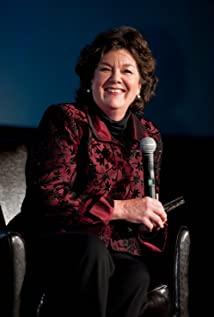For [Killing a Mockingbird], it belongs to the big name, and the ins and outs of the story have been known very early. However, my paranoia is committed again-first, I don't like American black and white films; second, I don't like Gregory Peck; third, naively thinking, what can be seen in such a tacky story?
You see, this is called ignorance, isn't it?
The first shot bluffed me-slowly shaking the camera at a pile of children's collections. I was thinking, hey, could it be this story? And what followed after that was almost family chores. The farmer in the village sent the special products, and the daughter was very happy; the son asked his father to play football with him, but the father quit, so the son stayed on the tree and refused to get down; a new neighbor came, and the three little guys talked together. It seems irrelevant, but the children call their father's name-Atticus. In fact, this is a typical contrast to the character's character from the side, and it also provides a meaningful basis for his willingness to defend the blacks. A person who is willing to let his child not call his father but directly call his name should be longing for and pursuing democracy and equality.
I have seen a lot of comments on the film for the next hour, but I think it is full of interest. The reason is simple. First, the film was clearly described and followed up from the perspective of a child, that is, the little girl Scout. Therefore, children can be seen playing innocently and innocently everywhere in the film, sometimes messy, sometimes full of adventure flavor. The child represents ignorant purity in the whole movie, but clearly possesses the courage of ignorance and fearlessness. They never look at black people with strange eyes, and they are not afraid to look for the legendary "Boo". They are actually far more cute and flawless than those respectable adults.
Many people like to talk about the court defense that lasted about ten minutes in the film. Of course, this is indeed a very good part of the quiet style of the whole film, but from my personal point of view, I prefer Atticus sitting in the front of Robinson. At the door of the house, facing the villagers who greeted the arrival. This kind of tension that does not move with one knife and one shot but is everywhere is shown in the entire loose structure, especially with a taste of potential. There is no extra background music, but it is the thick night and the strange silence, which contrasts with the danger of rattling the sword between the words. At this time, black and white is obviously simpler, brighter, and more direct than color.
Interestingly, it was the little girl Scout who finally resolved a possible blood and light disaster. In the beginning, the appearance of the three children only added to the tension on the scene, but when only the childish, fresh and innocent voice was heard under the night sky, I didn’t know whether it was the kind of innocence that infected everyone or her. The questioning made people feel a little guilty. In short, the fighting turned into a jade silk, which was shocking but not dangerous. This scene can be regarded as lingering after careful recollection, but after the crowd dispersed, the director used a long-term view, shot peck's sitting down, and answered the person in the room, "It's okay", neat and slightly reserved. Helpless.
The court defense scene is of course also good, but it has a distinctive American logo. I mean, there are similar scenes in many American movies, so it won't make people look as good as the last one. However, Peck's performance here has his distinctive personal touch: not passionate, but calm and sophisticated. Especially when he heard the obvious framing, his face did not have the anger that I thought would appear, but it was a kind of helplessness and regret-this kind of performance is mature and restrained, because from Atticus's personality, he is a forbearance. There are more people than those who have erupted, plus the education and the age and environment they are in, so naturally there will be no meaningless emotional catharsis.
The post-processing of the film is also amazing. Robinson is dead, but the main criminal spit on Atticus's face. The "robin" symbolizes innocence and pure beauty. Its strangulation obviously represents an accusation against the general environment. There has never been absolute justice in this world, and even too many sacrifices for the so-called order. However, the metaphors that always exist in the film clearly carry unerased hope-the "boo" that has been kept secret in the crowd appeared and saved the brothers and sisters. Life continues, and the children's collection is more like a kind of pairing. The yearning for truth, goodness and beauty. The iconic gentleman demeanor of peck still exists and can still travel through this town.
View more about To Kill a Mockingbird reviews


